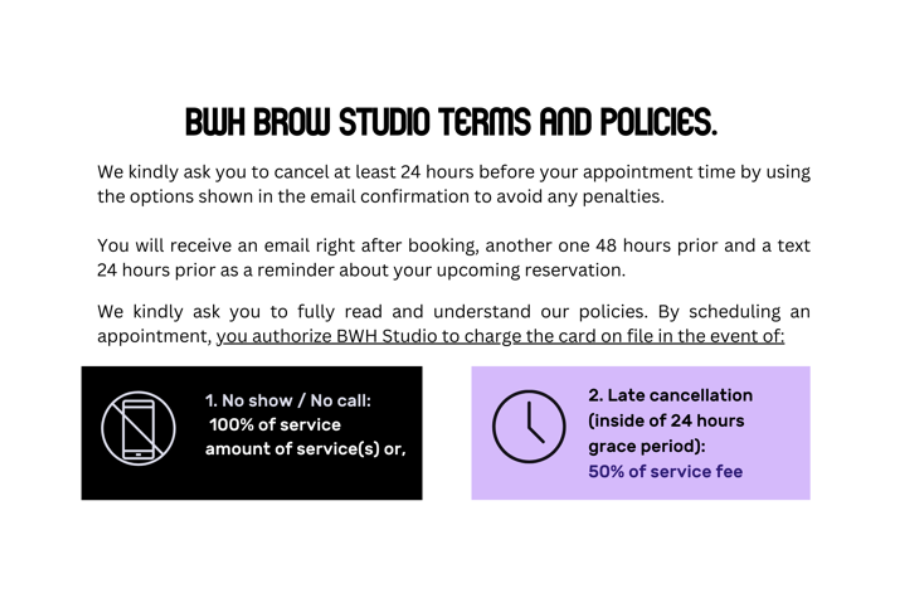
Cancellation policy: How to deal with last minute cancellations?
written byLisa Sazonova
In This Article
The impact of cancellation for your Brow Salon
As brow artists or beauty professionals, we understand the financial strain that comes with too many cancellations. It's not just about money; it's about the wasted time spent preparing for the appointment, the lost hours, the effort you put into building your business, the lost opportunities to fill that slot with another client, and the potential impact on your overall income for the day.
But there's hope! By recognizing the full impact of cancellations and implementing clear cancellation policy, you can minimize the financial strain.
Why do clients cancel?
Before we look at the solutions, it's important to understand why your clients cancel appointments. It can be due to unexpected circumstances like illness, emergencies, or scheduling conflicts, which can affect even your most loyal clients. Other times, it may be because clients were not satisfied with previous experiences or simply because they forgot. And with some customers, it is because they don’t take someone else’s time seriously. Sounds hard, but it’s the truth. Those customers just book, but don’t have respect for the service provider on the other side of the booking that is actually counting on them showing up. Rude, annoying, and unfair, but it happens.
By recognizing these reasons, you can adjust your approach to cancellations and develop strategies to address them proactively. Especially for the last category of clients, it’s important to protect your business and your valuable time. Cause, in the end, time is your most valuable asset as a brow artist. We only have so many hours in the day.
Communication is key
We've all experienced the disappointment of a last-minute cancellation disrupting our carefully planned schedules. It's frustrating, isn't it? Clear communication with your clients about your cancellation policy can ensure smoother operations and it also ensures that clients who may not be aware of the policy won't be surprised later on. It's about setting expectations upfront and fostering mutual respect with your clients.
Here are some practical tips on how to communicate your policy effectively:
1. Make it visible: Make sure that your cancellation policy is displayed on your website, social media platforms, and booking portals. Transparency is crucial for setting clear expectations right from the start. Here is how you can make your policy visible:
a. Website:
Consider dedicating a section of your website specifically to your cancellation policy. This section should be easily accessible from your homepage and clearly outline your policy in simple, straightforward language. Use headings, bullet points, or bold text to make important points stand out.
b. Booking platforms:
If you use online booking platforms or scheduling software, make sure your cancellation policy is displayed during the booking process. Many platforms allow you to customize confirmation emails or booking pages, allowing you to include your policy details where clients can easily see them.
c. Social media profiles:
Don't forget to mention your cancellation policy on your social media profiles. While you may not be able to include all the details, you can provide a brief overview and direct followers to your website for more information.
You can also consider creating a dedicated highlight on platforms like Instagram where you can feature your policy as a story. You can create the story in Canva! It is easy and they have templates available that you can customize. Below is an example of an Instagram post dedicated to the cancellation policy by Worthy Skin & Beauty Bar.
d. In-person signage:
For clients who visit your salon or studio in person, consider displaying signage that highlights your cancellation policy. This could be a poster near the reception desk or a small notice in the waiting area.
By making your cancellation policy highly visible across various channels, you ensure that clients are well informed before booking an appointment. Transparency builds trust and helps to manage expectations from the outset.
2. Include reminders: When sending out appointment reminders, gently remind clients about your cancellation policy. This serves as a friendly reminder to honor their commitment and respect your time. Besides, timely reminders are essential in preventing cancellations as they help clients remember their appointments and ensure they arrive as planned!
3. Finding the right tone: Try to find a balance between firmness and friendliness in your policy. You want clients to understand the importance of respecting your time while feeling valued and appreciated.
By prioritizing clear communication, you can create smoother bookings and stronger client relationships. Setting expectations early and maintaining open dialogue can lead to a more positive experience for both you and your clients!
How to set up a cancellation policy for your beauty salon
Now that we've covered the importance of clear communication, let's look at setting up a cancellation policy that works for both you and your clients.
1. Calculate how much revenue you miss out on
A lot of Brow artists and Beauty Professionals find it sometimes hard to create a strict cancellation policy or to set their boundaries. It may feel too strict for them, or they find it hard to communicate this to customers. Therefore start with this simple practice:
- Step 1: Write down how many cancellations you have in one week, and calculate how much revenue you missed because of it.
- Step 2: Calculate the amount for a month by multiplying step 1 times 4.
- Step 3: Calculate the amount for a year by multiplying step 2 times 12.
This simple math assignment will show you how important it is to set your boundaries. If you don’t take your boundaries seriously, why would others do that? With this simple practice, you exactly know what you’re missing out on. And sometimes that big number is the last push you need to make the change. Your time is valuable and deserves all the respect. Period.
2. Define your terms:
Begin by defining the specific terms of your cancellation policy. Consider factors such as how much notice you require for cancellations, whether there will be any fees associated with late cancellations or no-shows, and any exceptions you may make for emergencies.
Examples of cancellation policies
When it comes to defining your terms, we concluded some examples of cancellation policies you can integrate into your beauty business. The stricter it gets, the more and the quicker they have to pay the full-service charge. Which cancellation policy would be the most fitting for you?
- Minimal cancellation policy:
No fee for cancellations made at least 48 hours before the appointment.
Cancellations within 48 hours of the appointment will result in a 50% charge.
No-shows will be charged the 50%.
- Standard cancellation policy:
No fee for cancellations made at least 24 hours before the appointment.
Cancellations within 24 hours of the appointment will result in a 50% charge.
No-shows will result in a 100% charge of the service fee.
- Extra strict cancellation policy:
Cancellations made at least 24 hours before the appointment will result in a 50% charge.
Cancellations within 24 hours and no-shows will result in a 100% charge of the service fee.
For example, Fatima Hussain from The Allure Atelier in Albany, New York has a good and clear cancellation policy (read more here):
- Cancellations made with 48-hour notice will incur a 50% charge.
- Any cancellations made within 24 hours of the appointment will result in a 100% charge.
- 'NO-SHOWS' will be subject to a 100% charge of the service amount, and re-booking will not be possible.
To make it impossible to re-book sounds extreme, but let’s dive further into it. Fatima Hussain, is a very talented and popular Brow Artist, with a full client list and a waitlist for new clients. Meaning she tries to do her best to service all of her clients in the limited time frame she has. Not respecting her time is therefore a big no-go. Plenty of others would have loved to take that spot, but aren’t able yet to because of the waitlist. So a no-show is simply a big sign of disrespect to her work, skills, and valuable time. And if you can’t show that respect, she prefers to move that spot to a new client who can’t wait to start with her. We love how she sets her boundaries and is open and clear in communications! A great example of how a cancellation policy is done right.
Here is another example of a good cancellation policy of Browaholics:

3. Consider your business needs:
Take into account your business model, scheduling practices, and the potential impact of cancellations on your operations. Your policy should strike a balance between protecting your time and resources while remaining fair and reasonable to your clients.
4. Communicate clearly:
Once you've established your policy, ensure that it is clearly communicated to your clients across all relevant channels. Use the tips we discussed earlier to make your policy visible on your website, social media platforms, booking portals, and in-person signage.
5. Be flexible:
While it's important to be understanding of your client's needs, it's also crucial to enforce your policy consistently. Be prepared to handle situations where clients may attempt to circumvent or challenge your policy, and be ready to stand firm in your decisions while remaining professional and empathetic. Unforeseen events can always happen, we are only humans, right? It’s up to you how you manage them and how often you allow them to happen. If a client is always late or comes up with excuses often why to cancel their appointment last minute, maybe it’s time for a good conversation.
6. Review and revise as needed:
Finally, regularly review and evaluate your cancellation policy to ensure that it remains effective and aligned with the evolving needs of your business and clientele. Be open to feedback from clients and be willing to make adjustments as necessary to maintain a positive and mutually beneficial relationship.
Setting up a cancellation policy tailored to your business needs and client expectations is more than important. Remember, cancellations are part of the business landscape. By focusing on transparency, flexibility, and a client-centric mindset, you can turn cancellations into opportunities for growth, learning, and stronger client relationships! And remember - cancellations are frustrating for everyone, you are not alone in this, we've got your back! Want to read more business tips? Read our other blogs, like ‘How to get more online reviews’ or ‘How to increase prices without losing customers’.
























































